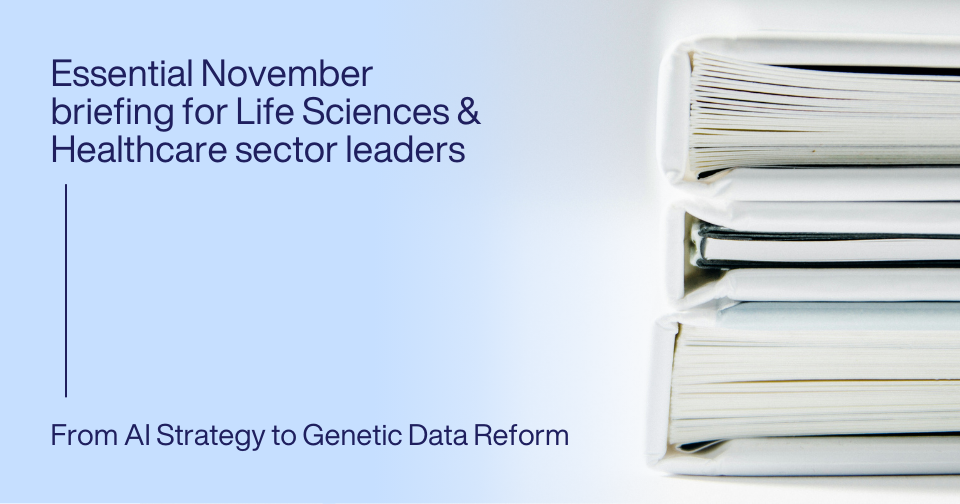The EU is taking steps to integrate AI into healthcare and research by directing efforts to establish centres of excellence. Additionally, a stronger focus is being put on strengthening the European Research Area and developing innovation-driven policies. In this newsletter, our Life Sciences & Healthcare team will spotlight key legislative changes in our region and across the EU that are shaping the future of life sciences and research.

Impact of the Apply AI Strategy on the life sciences and healthcare sector
On 8 October 2025, the European Commission published the Apply AI Strategy, which outlines initiatives to address challenges in applying AI. The European Commission is investing EUR 1 billion to advance AI across range of sectors, including in the healthcare and pharmaceutical sectors.
Healthcare-related AI patents in the EU increased twentyfold from 2016 to 2024. However, the uptake of AI has been slow due to numerous barriers: data quality issues, heterogeneous kinds of infrastructure, limited AI literacy, and questions of skills and trust among healthcare professionals. In the Apply AI Strategy, the Commission highlights actions to be taken to promote development of healthcare and medicines.
To support AI in the healthcare sector, the Commission will:
- establish AI-powered advanced screening centres that will support the testing and validation of AI models, including for personalised prevention and provide access to high-quality datasets via the European Health Data Space and European digital infrastructures for cancer imaging and genomic data.
- establish a European Network of Expertise on AI Deployment in Healthcare to share guidelines and best practices.
To support AI adoption in medicine development, the Commission will:
- launch an AI drug discovery challenge for potential new drugs targeting unmet medical needs or hard-to-treat diseases (e.g., Alzheimer’s, cancer). The winner of the challenge will receive access to AI Factories compute capacity, and advice on how to bring their inventions to market.
- streamline market entry for medical devices without compromising safety.
The Apply AI strategy indicates the direction the Commission will take in the upcoming years. As a result of the strategy, the combination of funding and establishment of centres of excellence will likely significantly enhance early prevention and diagnosis, personalised healthcare, and medicine discovery.
Impact of the European Research Area Act on R&D
The EU R&I ecosystem is being negatively impacted by multiple factors, such as (i) fragmented regulatory frameworks, including for quality assurance and recognition mechanisms, (ii) uneven R&D investment, (iii) barriers to knowledge-sharing, and (iv) barriers to interdisciplinary, intersectoral and international cooperation.
To address these issues, the European Commission launched a public consultation on the European Research Area (ERA) Act on 13 October 2025.
The ERA Act aims to tackle these issues in the following manner:
- setting an investment target – national commitments to reach a 3% of GDP R&D investment target.
- aligning investments and policies between the EU and member states.
- establishing framework conditions for researchers by improving research careers, geographical and intersectoral mobility, and open science measures.
- safeguarding values across the European Research Area.
The public consultation is open until 23 January 2026. The public consultation will gather insights into the challenges facing the European Research Area and stakeholders’ perspectives on solutions. The Commission considers the result of the public consultation, which may shape the ERA Act proposal.
Changes to the foundation of genetic data processing in Estonia
The Estonian Ministry of Social Affairs has drafted a Human Genes Research Act (new HGRA). This repeals the old Human Genes Research Act, which regulated only genetic research connected with the Estonian Biobank. The new HGRA will also regulate scientific research and human genetic research that has no connection to the Estonian Biobank, provided that the data is collected or processed in Estonia.
The new HGRA establishes additional requirements for persons processing genetic data for research purposes. According to the new HGRA, the controller responsible for scientific research must: 1) have the necessary professional knowledge and resources; 2) thoroughly comply with legislation regulating scientific research, good scientific practices, and ethical standards; 3) ensure compliance with personal data protection requirements. Additionally, before being able to process genetic data, the controller must undergo an ethics committee procedure and obtain the committee’s approval. Payment of fees may be required for the use or release of data for scientific research purposes.
Furthermore, the data in the Estonian Biobank will be compared and supplemented with the data from multiple databases:
- Health Information System
- Population Register
- Medical Prescription Centre
- Myocardial Infarction Registry
- Health Insurance Fund database
- Cancer Registry
- Pregnancy Information System
- Cancer Screening Register
- Cause of Death Register
- Tuberculosis Register
Comparing and supplementing the data will increase the reliability of the Biobank and boost the level of scientific research based on the data. This will attract researchers, especially considering that the Estonian Biobank has over 212,000 gene donors (nearly 20% of the adult population).
Parliament rejects proposal to delay sugar tax in Lithuania
The Lithuanian Parliament has declined a proposal to delay the introduction of a sugar tax by one year. It was suggested that the tax be deferred until 2027, but this initiative was rejected. As a result, the sugar tax is set to take effect on 1 January 2026.
Under the law, the tax will apply to sweetened beverages – including water, mineral water, and other drinks containing added sugars exceeding 2.5 g per 100 ml or sweeteners, which are not classified as alcoholic beverages or ethyl alcohol. Beverage concentrates are also included within the scope of the tax. However, pharmaceutical products, medical devices, food supplements, foods for special medical purposes, infant formula, and follow-on formula are expressly excluded from the tax.
Sorainen Riga Office hosts annual Life Sciences webinar
Sorainen Riga office recently held its annual webinar for Life Sciences sector group clients, attracting almost 200 unique listeners. The webinar brought together Sorainen legal experts to discuss the fast-evolving regulations for healthcare, with a special focus on telemedicine, artificial intelligence, and the new European Health Data Space Regulation. The event featured presentations by lawyers Ieva Andersone, Marika Grunte, Katrīne Pļaviņa-Mika, Krišjānis Cercens and Reinis Papulis.
One of the central topics was telemedicine, highlighted through a recent Austrian case involving Dr. Smile, a cross-border online dental aligner service, in the light of the recent preliminary ruling proceedings (Case C-115/24). The case illustrates the challenges which arise when digital platforms combine remote treatment with in-person services delivered in another country. EU law requires that telemedicine is considered delivered in the country where the provider is established, but only if the service is fully remote. If any part is performed face-to-face, the local laws of the country where the treating doctor is based. This distinction has major implications for licensing, liability and patient safety.
The webinar also addressed the EU Artificial Intelligence Act, which came into force in 2024. Speakers outlined how health institutions should approach the procurement and internal use of AI systems, especially those classified as “high-risk”. Organisations are encouraged to map all the AI tools they use, assess risks and develop clear internal governance policies to ensure safety, transparency and compliance with data protection rules.
Another major part of the event was focused on the European Health Data Space (EHDS), a new regulation that will reshape how health data is accessed and shared across Europe, starting from 2027. The EHDS will give patients better access to their electronic health information and create a unified framework for using data for research, innovation and policy-making. In Latvia, additional national legislation is being prepared to support the secondary use of electronic health data even earlier.
Finally, speakers discussed data protection and e-health system responsibilities for medical institutions. Key recommendations include strengthening internal policies, restricting access rights for staff, documenting data-processing incidents and ensuring secure cross-border cooperation.
The webinar concluded with practical guidance on how legal advisers can support healthcare providers – from compliance checks and drafting telemedicine procedures to managing regulatory risks, innovative digital health products, and patient-related disputes.
The event recording (in Latvian) is available here.
Need guidance on these topics? Our Life Sciences & Healthcare team is ready to help you navigate regulatory changes and compliance challenges. Contact us at marika.grunte@sorainen.com or reach out to your Sorainen contact for tailored advice.
#sorainenlifesciences: our practice in action
- On November 25, the annual Estonian autumn business breakfast for the life sciences and healthcare sector will take place, this time focusing on dispute prevention and resolution in areas of importance to entrepreneurs in the life sciences and healthcare sector. Both data protection and intellectual property will be considered. More information is available here.
- On 31 October, the American Chamber of Commerce in Lithuania’s Healthcare, Medtech & Biotech Innovations Committee marked an important achievement by finalising and releasing its white paper on matters related to medical device reimbursement. The work on the paper was carried out by the committee’s dedicated reimbursement working group, led by Dovydas Gudžiūnas, head of the Sorainen Life Sciences sector group in Lithuania. The white paper was also presented to the Vice-Minister of Health Daniel Naumovas during the committee’s recent roundtable discussion. The document is available here.
Our international Life Sciences & Healthcare team is at your disposal, should you need advice on any legal issues you are facing.
Subscribe here if you would like to receive newsletters and invitations to webinars and offline events.
Contact our experts:

Regional head of Life Sciences & Healthcare sector group, Estonia

Senior Associate, head of Life Sciences & Healthcare sector group in Latvia

Senior Associate, head of Life Sciences & Healthcare sector group in Lithuania


